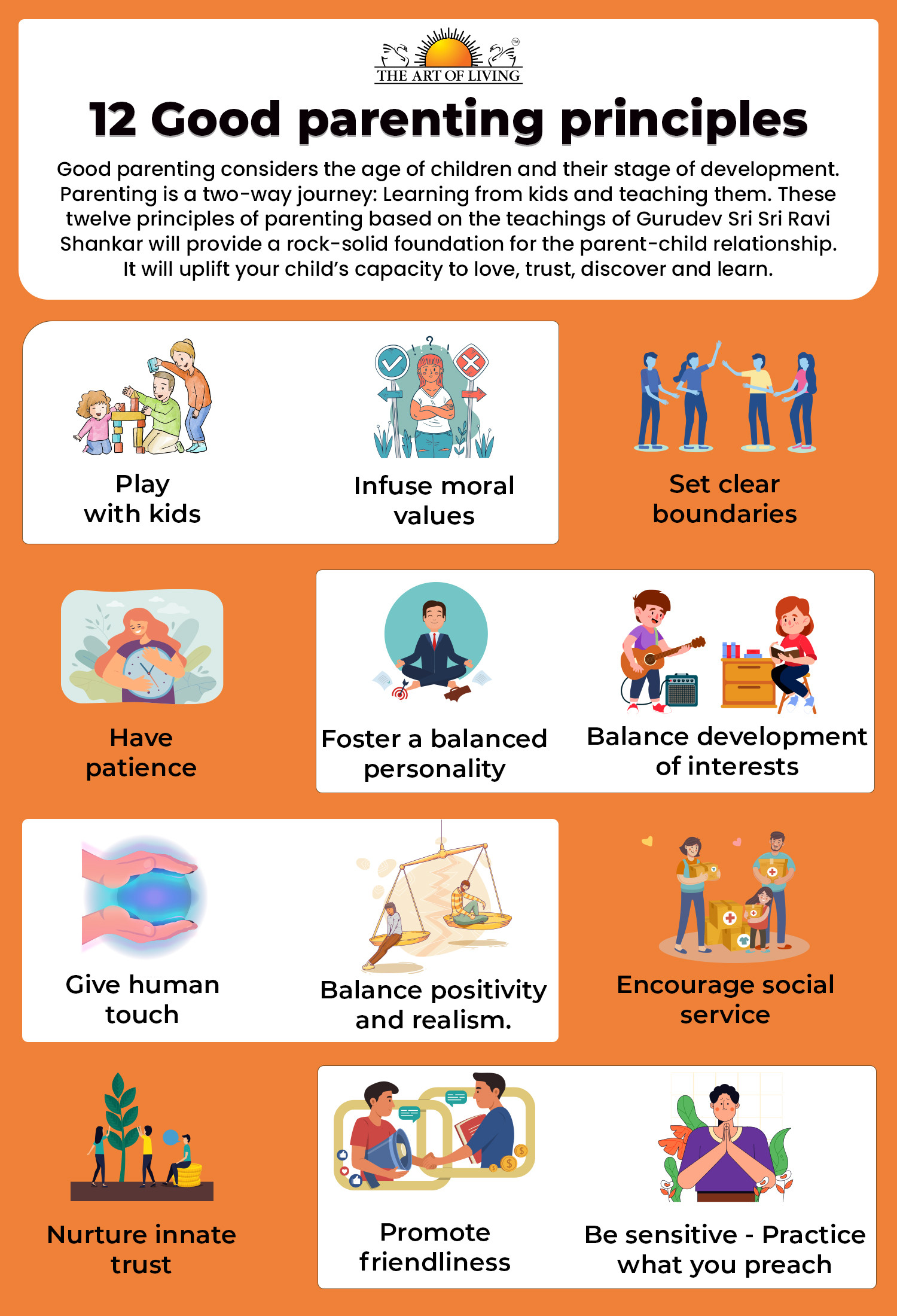While parenting my kid, I always remember that I was also a kid once upon a time. My parents had a broad understanding while parenting me, which was successful. I am grateful for the parenting practiced by my grandparents, which made my parents, good human beings. So do you see, the values are passed on from generation to generation? And so are the basic parenting tips.

What are the basic principles of good parenting?

Play with kids
Play with your kids. Celebrate and sing with them. Don’t try to be a teacher all the time. Learn from your children. Respect them. Don’t be too serious with kids. Gurudev once revealed, “My father would clap, tickle, chase us, and make us all laugh, on coming back from work.”
Have patience
Patience is the foundation of all other parenting principles. Do not get stuck on trivial issues. Parenting requires a lot of patience. You need to have patience and perseverance while dealing with your kids. Accommodate their desires while leading them on a desired path.
Give human touch
Keep some time for your kids. Spending half an hour to an hour is good enough. Also, don’t stifle by sitting with them for 5-6 hours. Kids should be looking forward to story time with you. You can tell them interesting stories to instill moral values. If you tell them nice stories, they will not be glued to the television or devices all the time. The human touch is needed. Don’t let your kids become non-participatory witnesses in front of the screen.
Nurture innate trust
By nature, children have the tendency of trusting. But as they grow old, somewhere their trust is shaken. Check if they trust themselves, in the goodness of people, and in the power of divinity. Trust makes the child a genius. Children’s talents and communication skills shrink if their trust is shaken. One of the main reasons for many unsuccessful entrepreneurs today is a lack of trust.
Infuse moral values
While addressing the issue of hyperactivity and aggression among today’s youth, it is crucial to infuse spiritual values, moral principles, and the ethics of compassion, friendliness, and love into our education system. We must recognize that the path to peace and harmony lies in nurturing these qualities within our youth.
Foster a balanced personality
Observe how your children interact with people of different ages - elders, youngsters, and their equals. This observation can help you understand if they are developing any complex. Help your children develop a personality that is
centered, talented and flexible. Create an interaction opportunity with all age groups by giving them responsibilities towards these different age groups.
Balance positivity and realism
When a child comes with complaints, do you encourage their negativity or mould it into positivity? When your child praises one who is not so praiseworthy, do you point out their flaws or let them be swayed by their false notions? In both cases, you have to balance them to a central line.
Promote friendliness

Set clear boundaries
While it's important to nurture and support your child's development, it's equally important to establish rules and expectations for their behavior. Gurudev Sri Sri Ravi Shankar emphasizes the importance of being firm but loving when enforcing these boundaries, and of using positive reinforcement to encourage good behavior.
Balance development of interests
You need to intertwine the activities of the left brain and the right brain, combining science and arts. The symbols in the depiction of Devi Saraswati, the goddess of learning, represent this balance with a book for the left brain, a musical instrument for the right brain, and meditation. It is important to ensure that children learn music, practice yoga and meditation, and also develop a scientific mindset. If they are more inclined towards one, encourage them to explore the other. For instance, if your child loves science, encourage them to also explore art by visiting museums or trying creative projects at home.
Encourage social service
Make your children take up some service activities. On a Sunday, take your children, give them some chocolates, and ask them to distribute them to the poorest kids. Encourage them to engage in social service at least once or twice a year. This experience will unknowingly enhance their personality.
Be sensitive - Practice what you preach
Be an example to your kids. Telling children not to lie, but instructing them to lie to guests by saying you're not at home won't teach them honesty. It may confuse children or even lead to manipulative behavior.
In Conclusion
In addition to these positive parenting principles, Gurudev Sri Sri Ravi Shankar's video "Parenting the Angels" has other valuable insights and positive parenting tips that can help you become a better parent. Gurudev also discusses the importance of maintaining a positive attitude, practicing meditation, and cultivating a sense of gratitude in both you and your child.
You may also read the book Know Your Child: The Art of Raising Children by Gurudev to get an all-round view of raising healthy children.
Parents and children have their unique strengths and weaknesses. Therefore, the parent-child relationship does not have standard rules. The same rules might lead to different results. But, the guiding force or the principles behind those rules will be similar.
Join the Art of Living’s Know Your Teen workshop and gain valuable insights to understand your teen better, just like many parents have already benefited.
Akanksha says, “The Know Your Teen workshop was a real eye-opener for me. You have not left any questions unanswered. I have registered my husband for it too. Actually, if both parents do it together, they will be on the same pitch.”
The Art of Living’s Children and Teens Programs imbibes your child with life skills. These are specially designed online meditation & breath programs for your children & teens. Find a program as per their age.
Utkarsha Yoga 8+ up to 13 years
Medha Yoga 13+ up to 18 years
Intuition Process 5+ up to 18 years
Written by: Pratibha Sharma
FAQs
संत कबीरदास (Sant Kabirdas)
धीरे धीरे रे मना, धीरे सब कुछ होय।
माली सींचे सौ घड़ा रुत आये फल होय।
अर्थात्:
मन में धीरज रखने से सब कुछ होता है। अगर कोई माली किसी पेड़ को सौ घड़े पानी से सींचने लगे, तब भी फल तो ऋतु आने पर ही लगेगा!
Everything happens with patience in the mind. Even if a gardener starts watering a tree with a hundred pitchers, it will bear fruit only when the season comes! Similarly, children can’t be forced to grow up quickly. They grow up at their pace. That is why patience plays a major role in parenting.
To answer what good parenting is, you need to be in unconditional love and understanding with kids.
Ten responsibilities of parents are -
1. Provide your kids the basic needs to live a comfortable and respectable life
2. Assess the reasons for your child’s demands with friendliness
3. Encourage in your kids’ a sense of pride, imagination and unique traits
4. Have patience. Don't get stuck on trivial issues
5. Teach them human values and discipline
6. Spend quality time with your children
7. Provide your kids education to develop into good human beings
8. Make them wise decision makers through storytelling or creating opportunities for them
9. Let them quarrel with their siblings and friends to foster in them conflict-resolving ability
10. Teach your child to function responsibly and independently
Consistent and positive discipline applied with mutual respect is most effective.
1. Be apologetic for your faults
2. See your child as a human being and not your personal property
3. Don't be mean, manipulative and harsh with your kids
4. Don't make them dependent on you for trivial things as they grow
5. Focus on proper future behavior than punishing past misbehavior
The twelve rights of child are -
1. Right to free and compulsory elementary education for all children in the 6-14 year age group
2. Right to be protected from any hazardous employment till the age of 14 years
3. Right to be protected from being abused and forced by economic necessity to enter occupations unsuited to their age or strength
4. Right to equal opportunities and facilities to develop in a healthy manner and in conditions of freedom and dignity and guaranteed protection of childhood and youth against exploitation and against moral and material abandonment
5. Right to early childhood care and education to all children until they complete the age of six years
6. Right to equality
7. Right against discrimination
8. Right to personal liberty and due process of law
9. Right to being protected from being trafficked and forced into bonded labour
10. Right of minorities for protection of their interests
11. Right of weaker sections of the people to be protected from social injustice and all forms of exploitation
12. Right to nutrition and standard of living and improved public health
A good mother is a selfless, loving human who sacrifices many of their wants and needs for the wants and needs of her children. A mother works hard to ensure her child is equipped with the knowledge, skills and abilities to make them good human beings.
Five positive parenting tips are -
1. To keep calm, practice yoga, pranayama and meditation
2. Say no to rewards or gifts to convince your child
3. Be involved in their daily activities in some way
4. Offer your kids opportunities of decision making
5. Handle emotional outbursts skilfully. Specify to them what needs to be done instead of negating words
Some important parenting skills are -
Stress managing skills
Life skills
Relationship skills
Learning and educational skills
Authoritative parenting is the best parenting style. It involves a combination of expectation and support that help children develop skills such as independence, self-control and self-regulation. According to the child's needs, authoritative parenting comprises a scope for changes.
Healthy parenting assumes children are born good and have the desire to do the right thing. It involves mutual trust and positive ways of discipline. A healthy parenting approach focuses on proper future behavior than punishing past misbehavior.


















